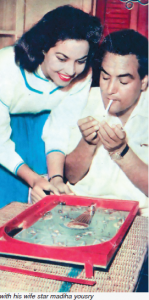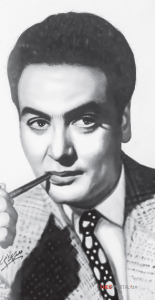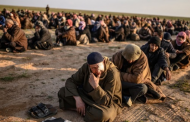Algeria honors who documented the “golden era” of national anthem
by: Fatma Barodi
On Sunday (December 17th), hundreds gathered at the Algiers Opera House to celebrate the depth of Egyptian-Algerian relations, where art blends with politics and brings back to memory the days of glory and pride.
The celebration comes on the occasion of the 60th anniversary of the creation of the national anthem of Algeria, “a section”, where President Abdelaziz Bouteflika decided to honor the composer of the national anthem, the late Egyptian musician “Mohammed Fawzi” and to grant him the “National Order of Merit” post-mortem.
In the framework of the celebration, the artist was named the Algerian Higher Institute of Music by presidential decree.
This is how the echoes of history echo again, recalling the “golden era” of the friendship between the two countries, which is full of events and the historical positions that are critical to its leaders at the time.

The Algerian national anthem, written by the poet of the Algerian revolution, Moufdi Zakaria (1908-1977), and for this anthem, which suggested two versions to be composed by him, Convinced the leaders of the National Liberation Front at the time before the decision in 1956 to adopt the third version presented by the Egyptian musician Mohamed Fawzi (1918, 1966), which corresponds to the revolutionary dimension, which was crystallized Moufdi Zakaria in the idea of oath and the Covenant in the name of sacrifices and the sanctity of the land for the victory of the case.
Mohammed Fawzi picked up his sense of this idea and the fact that around it a musical form of sheer enthusiasm of all costs, and its rhythmic simplicity raised the emotion of honesty and dedication in the anthem.
This is because the genius of Mohammed Fawzi in itself lies in the simplicity of the bars that prevent any action the power of meaning. Thus, Mohamed Fawzi gave Algeria one of the most beautiful national anthems in the world, and a link as much as the Algerians who made his name an integral part of national memory. On the streets of Algeria, no one mentions the story of the national anthem, but pointed out in a tone of pride that it was a melody by Mohamed Fawzi, the artist who documented the history of the two countries and is not meant to be included.
Mohammed Fawzi did not know when he said that the tune of the national anthem “section” a gift to the Algerian people will make him a great place and distinguished not made by Umm Kulthum or Abdul Halim or the giants of Arab art, in the history of a country that knows the meaning of loyalty to the oath.
A place to be reckoned with in his long career as the founder of an Arab musical industry and the composers who wanted to penetrate different musical worlds from the mainstream to make the innovation.
Mohammed Fawzi was a professional artist in the Arab liberation environment and a worthy course in the midst of the events of that period from the 1950s to the 1970s, where Egypt imposed its status as the pole of the radiance of Arab art, and where the artist opened his eyes on the dream of dedicating this movement.
The story of history tells us that the “Hellfire Soldier” of music did not imagine that the child he used to sit with, teach him music and test his voice in singing would become a science of music and singing in Egypt.
The soldier of the fire was called Mohammed al-Kharbatli, who was accompanied by Mohammed Fawzi to sing in the villages and cities of Al-Gharbia governorate in the middle of the Egyptian delta and in Al-Montazah Park in Alexandria, but Mohammed Fawzy, born August 15, 1918, decided to go to Cairo in 1938 to start his journey with art, where he encountered many stages of ascension and landing until he became a well-known Egyptian musician and singer. All of his songs bring joy and make you smile and feed you hope.
Even those that sing about abandoning the beloved do not feel the flow of abandonment or the pain of parting as much as you feel that “to abandon the limits and life will return to normal among the lovers,” deservedly deserved to be described as a “cheerleader.”
“His lyrics are so simple, complex, light-hearted, without waiting to translate their meanings like a bullet that fascinates new musicians to re-distribute them,” said Mohamed Abdel Wahab, a generation musician.
During his few years of singing and compositions, Fawzi was able to sit on the throne of cinematic music and theater during the 1940s and 1950s. Many of the songs in the films he has starred in are all of his songs, as well as for many of his time singers such as Mohamed Abdel Muttalib, Laila Murad, Nasek, Huda Sultan, Najah Salam, and many others.
In his career Mohamed Fawzi was the first in several things:
He was the first to present a melody with no musical instruments, relying solely on human voices, from the soprano to the bus, which was known as “Akabila”. The song “Kalamni wa Tamaani” was a vivid expression of this art. A new artistic and strange artistic medium, but achieved an unprecedented achievement.
He was the first to establish a company for CDs, which was in 1958 and was called “Egypt Von”, which contributed to the publication of the song in the Arab world. It was a blow to the foreign cylinder companies that were selling the cylinder for 90 piasters, while Fawzi sold it for 35 piasters, and the first to introduce a song for the child, which is still hesitated so far, and most famous songs of “Mama Zamanha Jaya”, “zahab al-liel” “Hato Elfaones ya wlad”
He was also the first to present the song “Franco arab” called “Mustafa ya Mustafa” by Bruno Mori, the brother of the international artist Dalida and the singer Bob Azzam in 1961.
He also introduced Franco Arab’s other song, “Fatouma Ana albi Habak”.
it is said that he suffered from poverty until the mid-fifties of the last century contract to work with the theater of Badia Mesabni (and the months at that time) of 5 pounds a month, and that was a large amount of time, and informed me that there is a love relationship between him and a dance company called ” Lola, “and the regulations of the band prevented any relationship of love between the members of the band so as not to affect the process of work, which led to the expulsion of Lula, but Fawzi offered his resignation immediately in solidarity with his lover and sacrificed his salary.

Despite his fame for the light song, he composed the national anthem of Algeria, a section organized by the Algerian Revolution poet Mafdi Zakaria, and presented by Fawzi as a gift to the Algerian revolution.
It is still the official version of the national anthem of Algeria so far that Algeria will celebrate this occasion, Aziz Bouteflika, issued a presidential decree honoring the musician and granting him the “National Order of Merit” post-mortem. It was also decided to launch the name of Mohamed Fawzy to the Higher Institute of Music in Algeria.
Fawzi was diagnosed with hepatocellular carcinoma at the time and was treated as rheumatism.
Others treated him as a cancer in the bones and was described by a third team as “fibrosis of the posterior peritoneum,” but all said he had a rare disease until he died on October 20 1966
He wrote his will before leaving for hours and said: “I feel that I am dying like a candle … Death is right on us, and if we do not grow today, we will die tomorrow and I will praise God that I believe in my Lord. I am not afraid of death, which may relieve me of these pains. I wish that I would do much, but God’s will over all human will and age will not be extended by God, but I resorted to treatment so that I would not be in the wrong of myself and the future of my children who still seek knowledge in Cairo.
The sky of the most beautiful … Greetings to each child happy … Congratulations … Greetings to my country … Finally my greetings to my children and RTI “.








































admin in: How the Muslim Brotherhood betrayed Saudi Arabia?
Great article with insight ...
https://www.viagrapascherfr.com/achat-sildenafil-pfizer-tarif/ in: Cross-region cooperation between anti-terrorism agencies needed
Hello there, just became aware of your blog through Google, and found ...